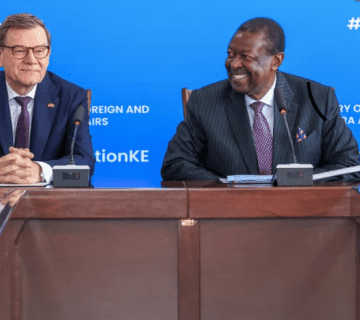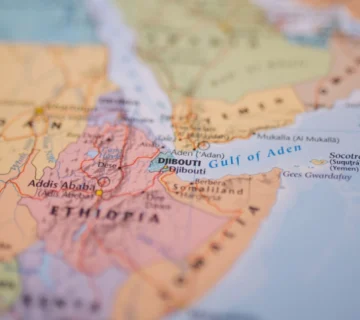Kenya’s President, Dr William S Ruto, is the man (from the global south) to watch as global geopolitics unravel at a pace never seen. Political, economic, security, and social dynamics (and realignments) in the post-pandemic world are redefining and torpedoing the existing world order. The world is on the cusp. Trust in international institutions and multilateral processes is at its lowest. International law and global order are now under severe test. Uncertainty abounds.
Leaders emerge during uncertain and challenging times for the world. Woodrow Wilson’s vision of the world led to the creation of the League of Nations. Franklin D Roosevelt’s liberal democratic internationalism and Harry S Truman’s policies birthed the famous Trumann doctrine in international relations. Nikita Khrushchev’s ‘peaceful coexistence’ policy, catapulted him after the destructive Stalin reign. Khrushchev’s détente ‘gifted’ the world a brief sigh of relief, easing hostility between the then USSR and the US.
Today, the world is still grappling with old wars and conflicts. It is now gripped by new ones, compounded by unresolved historical conflicts, potentially ushering in a multipolar order that will be bitterly contested. Realignments are now shaping up. BRICS, NATO, and non-aligned politics aside, the contending powers are putting forward arguments ranging from positive-sum power politics (China) to an inclusive world order (global south) to non-interference of traditional spheres of influence (Russia). The West, led by the US, is looking for new allies while at the same time, strengthening ties with old friends.
In the raging currents of geopolitics, Kenya, a promising, stable, and progressive anchor state, is in a particularly good place in sub-Saharan Africa. President William S Ruto was invited by the United States on a state visit, from May 23, 2024. He made history as the first African Head of State to be extended a state invitation to the US in 16 years. Kenya and the US share 60 years of strong ties defined by common values in democracy, human rights, and partnership for mutual prosperity and security. Themed Partnership for Prosperity, the strategic focus of the visit is on economic prosperity, trade and investment; democracy, governance, and civilian security, public health, defense, and multilateral and regional issues.
The decades-long relationship between Kenya and the US makes a strong case for President Ruto to renew and intensify partnerships with the US after years of the “look East” policy of his predecessors, Presidents Mwai Kibaki and Uhuru Kenyatta. The US, a wealthy superpower, bears enormous potential for Kenya to tap into and, by extension, the West, for which the US is the gateway. The West is collectively the single largest source of Kenya’s foreign direct investment inflows, whose stock now stands at USD 11.2 billion or 9.7 per cent of the country’s gross domestic product. The US holds 10.3 per cent of the total foreign asset stock in Kenya.
The US is also Kenya’s third largest trade partner (USD 60 billion annually), especially for Kenyan exports for which Nairobi enjoys preferential treatment in the US Africa Growth Opportunity Act (AGOA) and nascent free trade area (FTA) developments between the two partner countries. The US development aid is the largest Kenya has received in healthcare, capacity building of institutions of governance, sectors, programs, and personnel. The US has been a critical partner in Kenya’s democratization and political development through the years of clamor for multi-party democracy through the era of the new constitution.
The US supported Kenyan elections, reconstruction, and peace-building after the 2007-08 post-election violence and continues to underscore anti-corruption and human rights in its relations with Kenya. The US has, further, been a critical partner in the fight against terrorism in the Horn of Africa, including the Somalia-based al Shabab group, transnational organized crime, and violent extremism. Kenya, through the support from the US and in keeping with its “good neighbor” policy, has played and continues to play a critical role in regional security and stability through conflict prevention and management in the region.
Kenya, on its part, has maintained steady growth since the resumption of strong ties with the US after the democratic transition in 2002. The country’s economy has remained the largest in Eastern Africa, with advanced socio-economic conditions in relation to its regional peers. As the strongest democracy in the region, Kenya has been pivotal to regional security and stability and a key driver of regional integration through institutions, infrastructure, policies, and ideological foreign policy. In view of prevailing local economic aspirations and challenges, Kenya’s inter-operationalization of its Vision 2030 economic development blueprint and foreign policy has further sharpened the need to rebalance East-West interests and re-set relations with the West under President William Ruto.
Youth unemployment; little progress in technological development; climate change vulnerability; human resource development system re-orientation; growing healthcare, food, energy, and infrastructure demand; and a volatile neighborhood defined by conflict, violence, terrorism and violent extremism have defined President William Ruto’s foreign policy making. The president has also emerged as an ardent Pan-Africanist, voicing Africa’s agency on all global multilateral platforms and forums, garnering wide admiration in Africa and internationally. He has thus raised Kenya’s profile, as a growing economy in Eastern Africa and as the anchor state and influential power in Africa. As such, the state visit to the US underscored the president’s rebalancing, re-set doctrine, and Pan-Africanizing doctrine as well as Kenya’s position in US-African foreign policy.
The most visible and symbolic aspect of the state visit was President Joe Biden’s promise to designate and accord Kenya the status of a non-NATO ally. When this happens, Kenya will become the first in Sub-Saharan Africa to be given such a status. Although largely symbolic, such a status opens doors to deeper military and security partnerships with the West. But it also challenges and potentially undermines existing economic partnerships with the East.
In this regard, Kenya will have to deploy its sharpest and shrewdest security experts, diplomats, and negotiators to ensure that such a designation is translated into practical gains against what it will potentially lose in the future in an increasingly multi-polar world.
While President Ruto takes Kenya to the US with a basket of partnership prospects on the core areas of cooperation for the country’s short-term and long-term economic prosperity and security, the visit comes in the wake of changing global power dynamics. Africa and its key players hold a pivotal position as emerging powers such as China, Russia, India, Brazil, Turkey and others take on the US in geo-strategic competition.
The current environment of global geostrategic and geopolitical competition and rivalry is thus only an enabler for the “Ruto Doctrine” and hence the much anticipated and historic state visit to the US. With astute management of these international dynamics and such a high-profile posturing, President Ruto is in a timely quest for strategic engagements that secure economic prosperity and security for Kenya.
Traditionally, as Ruto does, presidents who strategically inter-operationalize domestic and foreign policy have benefited from the “rally behind the flag” effect. It is a matter of time, perhaps starting with the quantifiable value of the partnerships to be signed between Kenya and the US during and after the visit, that the larger picture of the president’s US state visit will unravel.
Balancing relations between two bitterly contesting blocks–the US-led and the China-led—all important to Kenya, is what a Ruto Doctrine will define, deploy, and navigate. With a tinge of hyperbole, Ruto’s US state visit and subsequent actions may be likened to the 1972 re-set between China and the US when President Richard Nixon met Chinese leaders Mao Zedong and Zhou Enlai. A Ruto Doctrine is unraveling with the US State visit.
President Joe Biden and President of the Republic of Kenya William Ruto hold a joint press conference in the East Room of the White House in Washington, DC on Thursday, May 23, 2024. Photo by Bonnie Cash/UPI
The views expressed in this article are those of the authors and they do not necessarily reflect the position of the HORN Institute.



